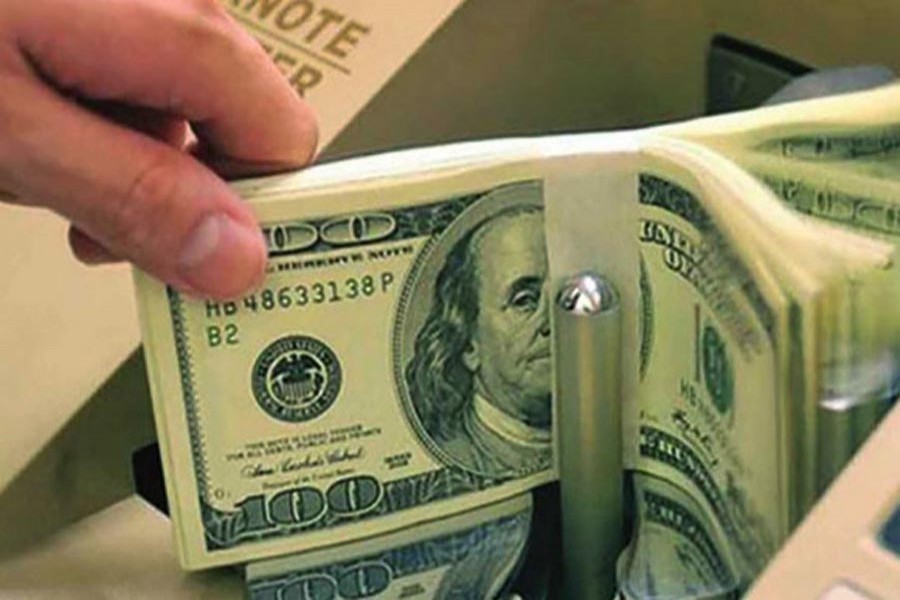Remittance inflow has hit a seven-month low. The country received $1.54 billion in September, which is a 25 per cent drop from that of the preceding month. This is a trend that has been going on for some time now. Back in June, Bangladesh received $2.09 billion. Experts are pointing accusing fingers at the central bank for fixing the dealer exchange rate as the primary cause for this downward spiral. The rate fixed at Tk108 is significantly lower than the hundi exchange rate that yields Tk113-114 per dollar against the greenback for expatriate workers.
Obviously, this will do little in the central bank's efforts to stabilise the foreign exchange (forex) market. At a time when the government is under increasing pressure to boost its forex reserves, how realistic are such interventions? Interestingly, a report in this paper has disclosed that several mobile financial services are now involved in the illicit hundi business. Criminal investigation by law enforcement agencies have unearthed a nexus of around 5,000 agents "from several mobile financial services, including Bkash, Nagad, Rocket and Upay (who) are involved with (in) the illicit money transfer, depriving Bangladesh of $7.8 billion in inward remittances a year." This organised group does not use any formal channel to send money to Bangladesh, but instead pays expatriate workers' families in the local currency. Apparently, it is a three-stage money laundering operation. First, they collect forex from Bangladeshi expatriates earning abroad, then the funds are handed over to another group. This group of money smugglers then contacts the third group, agents belonging to MFS (mobile financial services), who make payments in the local currency via mobile money account numbers.
The situation has reached a stage where the finance minister himself admitted that nearly half of the remittance inflow came through hundi or informal channels. Policy research bodies like Public Research Institute and CPD agree that fixing the rate of exchange will not help matters to solve the ongoing forex crisis. Yet something needs to be done urgently because the government is heavily dependent on inward remittances and exports to balance its books. With the ongoing energy crisis, experts have already pointed at a scenario when the apparel industry may be in dire straits to hold on to orders. According to the EPB (Export Promotion Bureau), export earning in September stood at $3.9 billion, recording a 6.25 per cent year-on-year negative growth.
Although the government has provided incentives for expatriate workers to send more money using official channels, for instance, offering cash-back up to 2.5 per cent, there still remains a yawning gap between rates offered by formal channels and those offered by informal channels. The ongoing crisis of the greenback has opened up a competition amongst banks to procure more dollars and are now offering higher rates for the currency. But with the kerb market outstripping anything the formal channels have to offer, these policy interventions are not bearing any fruit.
With the government spending a few billion dollars more on imports thanks to disruption in global supply chains, primarily due to the war in Europe, economists fear that the projected growth in exports will not pan out. So, a decline in remittance at this stage does not augur well for Bangladesh in the coming months or years, unless the illicit money market is reined in. It would be impossible to lure expatriate workers into legal channels, especially if the kerb market can offer so much more incentive.
Obviously the cash incentive, at the present rate is not doing the job. Policy analysts argue against raising the cash incentive from 2.5 per cent to 5.0 or beyond, but how else would this Tk 5.0-6.0 difference be bridged? The other question that comes to mind is the fact that hundi is popular amongst the masses who are not literate. This large and mostly rural populace who do not know how to read and write are the ones who will always steer clear of formal banking channels as it is simply too daunting for them. The hundi system involves neither a paper trail nor any question about withdrawals. On top of all, there is little lead time in conducting a hundi transaction, which is not the same for formal banking channels. Simplification of procedures allowing account holders to get their money transferred directly to their mobile wallets may be a step in the right direction.
It is time for the central bank to put its BFIU to good use. Its special drive at money changer houses must be an ongoing and not a one-off effort. Existing provisions allow a money changer to hold a maximum of $25,000 at the end of each day. "Cash beyond this limit will have to be deposited into their respective bank's foreign currency accounts. The balance of that account must not exceed $50,000 at any point in time." If these accounts are strictly monitored, it would be easier to keep track of illicit transactions and make a meaningful dent in hundi operations.
mansur.thefinancialexpress@gmail.com


